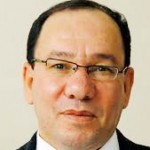Following the high-profile celebration of the 6 October victory in Cairo Stadium, at which President Morsy gave a lengthy speech, columnists discussed, analysed and critiqued the speech and the indications it relays. Reactions varied from praise, to admiration of political astuteness, to outright attack.
The stadium speech… a provisional analysis
Nader Bakkar
Al-Watan
Judging that most reactions to President Mohamed Morsy’s Cairo Stadium speech so far have been either senseless praise or unfair criticism, Nader Bakkar declares his intention to provide an objective analysis of the speech.
Bakkar deems the speech to have been effective despite the absence of a long-term economic vision, due to the fact that the president was orating to the general populace rather than the intellectual class, which required an emotional speech to reach the people, and in this regard he believes the president succeeded.
Bakkar views the choice of the venue to have been ideal, as the stadium allowed the president to display his popularity, even if the vast majority of attendees consisted of followers and supporters of political Islam.
The author also praises what he describes as the president’s strong response to questions and accusations regarding monetary compensations, although he notes that he would have preferred the president to provide a general response rather than referring to his critics directly.
Regarding the president’s decision to speak spontaneously rather than reading a prepared speech, Bakkar writes that it reflects positively on the man, displaying his deep involvement in all of the country and the government’s affairs, but that it also had its downsides, drawing the president into discussing overt details and extending the length of the speech beyond what was necessary.
When the president spoke
Emad El-Din Adeeb
Al-Watan
Emad El-Din Adeeb views President Mohamed Morsy’s Cairo Stadium speech as evidence of the man’s increasing political maturity, describing it as both more precise and more populist than all of those that preceded it.
The columnist singles out a number of elements as the most crucial observations to be taken away from the speech: the ability to fill the stadium with thousands of supporters, the president’s decision to enter the stadium in an open car (which Adeeb believes to be a successful attempt at political marketing and an opportunist assumption of the role of national leader), the president’s choice to improvise rather than read a prepared speech, and most importantly the fact that the president enjoys a very high level of awareness regarding the problems of the country and its people.
The latter observation, in Adeeb’s view, is evidence of President Morsy’s clear will to be knowledgeable regarding every detail, every number, and every development in every one of the country’s prominent issues. The author adds that the president must now advance from merely being aware to being able to tackle these issues.
In his final observation, Adeeb labels the speech a “pre-emptive strike,” as the president chose to engage the issue of his first 100 days in office swiftly and on his own terms before his detractors had an opportunity to strike.
Adeeb warns those who choose to challenge Morsy in the political arena that the man is extremely quick in his movements and manoeuvrings, and advises them to study the president thoroughly in order to understand with whom they’re dealing.
Sharm el sheikh awaits the new president
Wael Qandil
Al-Watan
Labelling the Cairo Stadium 6 October celebration a “huge exhibition,” Wael Qandil compares President Mohamed Morsy’s attempts to forge a populist leader persona to those of Gamal Abdel Nasser and Iranian president Mahmoud Ahmadinejad.
Qandil writes that the attention given to the 6 October war by Morsy during his speech pales to that lavished on the president’s own first 100 days in power and his achievements during this period, and the columnist claims that the marginalisation of the war during its dedicated celebration has prompted negative reactions to the speech and damaged Morsy’s popularity.
The author faults Morsy for failing to mention many of the great men of the Egyptian armed forces in his speech, particularly some of those who played a key role in the October victory. He also criticises the choice of Cairo Stadium as a venue for the celebration, believing it to be an attempt by the Muslim Brotherhood to demonstrate their ability to mobilise large numbers.
He condemns this attempt, claiming that the end result was a celebration tainted with partisan colours rather than an all-encompassing national celebration, as it is supposed to be.
Qandil states it would have been more fitting to hold the celebrations in the city of Sharm El-Sheikh, which he believes must be freed from its association with the name of former president Hosni Mubarak.
Perhaps in a veiled strike at political Islam and its effects on tourism, Qandil suggests that such a move would also send a reassuring message to potential tourists to aid a sector of the economy that has suffered great setbacks.





